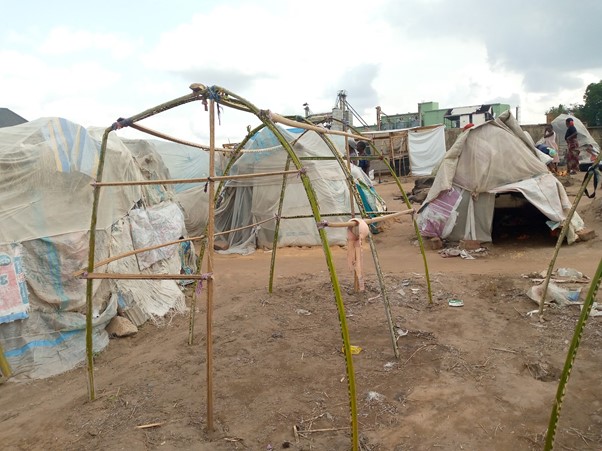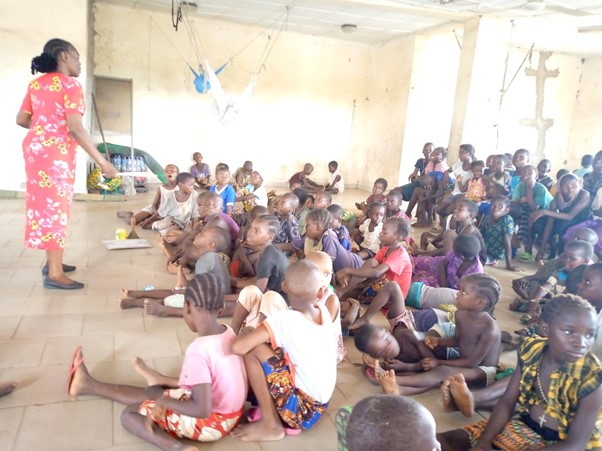Abagena Attack Aftermath: Hunger, Hopelessness In Benue IDP Camp
Pursued from their homes by terrorists, they ran for safety. Some, like Mama Mary Ubua, are old; others, like Gideon Tyobee, are young. Today, they seek refuge in an IDP camp where hunger rules and women are pressured for sex in exchange for food.

Mama Mary Ubua, 78, is still traumatised by the attacks in Benue State, Northcentral Nigeria, that put many like her in an Internally Displaced Persons (IDP) camp where hunger now reigns.
Two months ago, Mama Ubua lost her son, Zaki Ubua, who was the Abagena community’s traditional ruler. Today, what led to his death is still fresh in her mind. Most vivid is the attack and how they both tried to escape.
The sound of gunshots came in the dead of night when they were sleeping.
“At first I thought it was hunters testing their guns. Then I saw people running with some shouting and crying. Being this old, I was assisted by some young men whom I cannot remember,” Mama Ubua said.
They ran for a long time before they found a place to rest. The last time she saw her son was in the race for safety where he made sure she was safe. But then he was shot dead. “His corpse has been taken for the traditional burial according to chieftain rites,” Mama Ubua said.

The day HumAngle visited, Mama Ubua had gone without food until after 3:00 p.m. More displaced persons from different parts of Benue State have joined the Tse Yandev IDP camp, making it overcrowded up to the main road.
Currently, the rations of donated food have been reduced for each household and children lie hungry on the floor.

Constituency sharing in the camp
Tse Yandev IDPs have designed a simple way of accountability and representation for themselves. Each group has an officer called camp chairman, who represents his people before the camp officials. About three constituencies have been identified already: Abagena, Taraba, and Tse Yandev.
Gideon Tyobee, 31, is a displaced person from the Abagena community. He was at home when multiple gunshots filled the air. Like Mama Amua, he and others with him also thought the sounds came from the guns of hunters.
“That was how they killed eight people and the rest of us fled,” Tyobee narrated. “While hunger lasted, we thought we could outsmart them. At least we could have something to eat if we succeeded. Herders’ attacks were normally in the night and so we decided we were going to be sneaking intermittently in the afternoon to take some food.”
But they were wrong. Nine people were abused and killed. “We all ran and never returned again,” Tyobee said.
Traumatised and without hope
“I cannot sleep. Each time I close my eyes, I am haunted by memories of my son. He was the breadwinner of my family. This always reminds me of my husband whom I lost years ago. No doubt my days will be shortened. I haven’t had a good feeling since my son was killed,” Mama Ubua told HumAngle.
Mama Ubua has never experienced life out of her immediate community and this has affected her health.
Tyobee, on the other hand, is now displaced with his wife and two children who now suffer from different ailments and hunger in the camp. His father is also sick.
Lately, Tyobee has become suicidal and tries to avoid being by himself. The loss of his childhood friend has been traumatic. When memories of their time together come, he bursts into tears.
“Being the first child, my friend married early. He had two children with his wife before he was killed. The family is suffering; the wife has left with the children. I feel guilty each time I remember I couldn’t help my friend’s wife and children. She went to meet her mother in another IDP camp because her own family too is displaced,” he explained.
People prey on our vulnerability
As a carpenter, Tyobee decided to do menial jobs at the camp. Sometimes they are underpaid, sometimes employers do not pay at all and promise to do so the next day in vain.
“Our women are extorted; some request that they ‘service’ them before they could help with little food. Many of them have been treated that way and they have to keep their family from dying,” Tyobee said.
Dooshima Terzungwa, also an IDP for over three years, told HumAngle that they suffer a lot begging for food. “We go hungry for the whole day,” she said.
Rebuilding, battling sickness…
Since the rain started, their struggle has taken a different dimension. Some tents made from mosquito nets have been rendered useless by rainfall.
At the time HumAngle visited, Dooshima Terzunwe and her son were renovating what they call their cave, made of ropes, mosquito nets and palm fronds.
“This is how we repeatedly renovate and do new ones since our years in this camp,” she said.
There is an increase in ulcer cases as hunger persists. Then there is also malaria and other diseases.
“If you walk around this camp now, children lie helplessly on the floor. When you ask them why they are lying down, the common response is headache and chest pain. A large number of them even lie outside because their parents have gone out to look for food and perhaps haven’t returned for days,” Doowuese explained.
The plan to move them
Samuel Obeten, the camp youth leader said the State Emergency Management Agency (SEMA) has hinted of the plan to relocate them to another IDP camp in Ikpam village. According to Samuel, this is against their will and that place is not safe currently.
“They said Tse Yandev is not a recognised IDP camp. That as long as we continue to be here, we will not see any help from the state government,” Onetan said.
But many despair over the plan, saying Ikpam is not safe currently because the villagers have left the place and even the displaced have left to a much safer place.
Abraham Ioyem sees this as a plan to get rid of them. “It’s evident we don’t mean anything to them. They refuse to give us food and they are now telling us to leave for a place that is not safe,” he complained.
“We are over two thousand in this camp, including children. How do we move to that place? We know we are an eyesore to the state government, but let them do the needful. Secure our land for us, then we would leave here.”
Support Our Journalism
There are millions of ordinary people affected by conflict in Africa whose stories are missing in the mainstream media. HumAngle is determined to tell those challenging and under-reported stories, hoping that the people impacted by these conflicts will find the safety and security they deserve.
To ensure that we continue to provide public service coverage, we have a small favour to ask you. We want you to be part of our journalistic endeavour by contributing a token to us.
Your donation will further promote a robust, free, and independent media.
Donate HereStay Closer To The Stories That Matter




